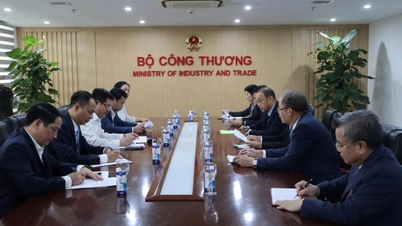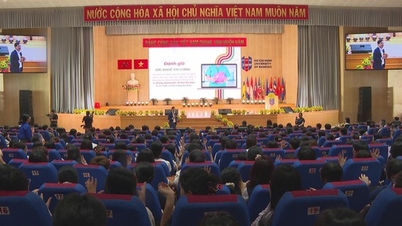
Concerns and expectations of business households before policy turning point
Decree 70/2025/ND-CP is an important step in the tax reform roadmap, gradually replacing the long-standing lump-sum tax mechanism. According to regulations, from 2026, business households will have to manage revenue and expenses, issue electronic invoices and make periodic declarations instead of paying fixed monthly taxes as before. This means that small traders and small businesses will have to completely change their management methods, from the habit of keeping notebooks to technological tools.
At the seminar "Accompanying business households and small enterprises in the digital age" organized by Kinh te do thi newspaper on the morning of September 25, 2025 in Hanoi, many opinions frankly shared practical concerns. Ms. Nguyen Van Hang - a small trader selling accessories at Dong Xuan market shared: "I am used to writing in notebooks, now I have to use cash registers, software, and electronic invoices, which makes me scared. I am also worried that I will have to spend a lot of money if I have to buy more equipment." This is also a common concern of many middle-aged business households, who are used to traditional management methods.
Not only Ms. Hang, thousands of business households at Dong Xuan market - where there are more than 2,200 trading households with annual revenue contributing about 67 billion VND in tax are facing the demand for change. Representative of Dong Xuan Market Joint Stock Company, Mr. Nguyen Ha Thanh - Deputy General Director emphasized: "Traditional markets like Dong Xuan are facing great opportunities for innovation, but also need strong support from technology and policy. The application of digital payments and electronic invoices not only helps traders operate transparently but also enhances reputation, creating an advantage in competition with modern sales channels.
From the perspective of local management, Ms. Nguyen Hong Trang - Vice Chairman of the People's Committee of Hoan Kiem Ward acknowledged: "In the ward, there are thousands of business households, many in the service- tourism sector. This group not only creates jobs but also contributes to the budget, but is also the group under the greatest pressure when having to quickly adapt to Decree 70. Local authorities really need coordination from tax authorities, banks, fintech and tax agents for direct support."
On a more positive note, many experts believe that this is an opportunity to change business thinking. Ms. Le Yen - Director of Hanoi Tax Consulting Company (Hanoitax) analyzed: "Long-standing habits make many people hesitant, but if they switch to transparent declaration, they will have easier access to capital, expand their business, and avoid legal risks. This is an opportunity for small traders to escape the 'closed loop' of small retail trading."
Obviously, with the same policy, some people see it as pressure, others see it as an opportunity. The core issue is how it is implemented and the accompanying support ecosystem.
Many solutions to accompany small traders
To help businesses overcome the transition period, many technological and financial solutions were introduced at the seminar. The common points of these initiatives are simplicity, ease of application and reasonable cost – key factors for small businesses to quickly adopt.

Representative of 9Pay Joint Stock Company, Ms. Vu Quynh Huong, Marketing Director, said: “In order for businesses and small businesses not to be left behind, fintech solutions need to focus on simplicity, ease of use and reasonable costs. 9Pay has developed a multi-utility payment gateway, supporting electronic invoice issuance, bank connection and especially optimized for small transactions at traditional markets or tourist shops.”
According to Ms. Huong, 9Pay not only provides QR payment tools, links e-wallets and international cards, but also has a service to receive money directly from international guests through the booking system, supporting the automation of expenses for hotels, restaurants and tour guides. “This is especially important for Hoan Kiem tourism businesses – where thousands of small value transactions take place every day but have a decisive impact on the experience of tourists,” she emphasized.
Mr. Luu Van Hoa - owner of a small hotel on Hang Be Street also raised a practical issue: "My hotel mainly receives international guests through booking applications such as Booking, but does not have its own payment system or IT staff. So is there a way to receive deposits directly from foreign guests to Vietnam safely and quickly?"
A representative of a travel agency attending the discussion added: “The tourism industry has the characteristic of having to pay a lot of small expenses to restaurants, hotels, tour guides, transportation vehicles, etc. If done manually, it takes a lot of time and is prone to errors. Is there any way to automate these expenses?”
These opinions show that fintech not only provides payment tools, but also contributes to reshaping the way costs are managed and increasing operational efficiency for small businesses.
Along with fintech, banks have also committed to accompanying. BacABank and PGBank have introduced preferential credit packages, in which business households and small businesses that implement financial transparency through electronic invoices will be given priority for approval. This is an important change, because from now on, transparent declaration data can become the basis for accessing capital, instead of relying solely on mortgaged assets.
According to analysis at the seminar, this can create a “new cycle”: the more transparent, the easier it is to access credit, thereby having more resources to expand business. This is also the motivation for business households to proactively transform instead of passively implementing.
The local government also proposed that the State should consider an initial cost support package, especially for small businesses. This would help reduce the financial burden of investing in software or equipment, thereby encouraging small businesses to boldly embark on the transformation path.
Reality reflects clearly two sides of the problem: on one side is the concern about costs, procedures and technological capacity; on the other side is the opportunity for transparency, access to capital and increased competitiveness. More importantly, the participation of management agencies, banks, fintech, technology enterprises and tax consultants has formed a "companion ecosystem".
It is this ecosystem that will determine whether small businesses and households can overcome the “policy shock” smoothly or not. With synchronous coordination, the digital transformation process is not only a legal requirement but also an opportunity for the private economic sector to develop transparently, professionally and sustainably in the spirit of Resolution 68 of the Politburo.
Source: https://nhandan.vn/dong-hanh-cung-ho-kinh-doanh-va-doanh-nghiep-nho-trong-ky-nguyen-so-post910416.html


![[Photo] General Secretary To Lam chairs the meeting of the Central Steering Committee on preventing and combating corruption, waste and negativity](https://vphoto.vietnam.vn/thumb/1200x675/vietnam/resource/IMAGE/2025/9/29/fb2a8712315d4213a16322588c57b975)

![[Photo] General Secretary To Lam receives Chairman of the State Duma of the Russian Federation Vyacheslav Volodin](https://vphoto.vietnam.vn/thumb/1200x675/vietnam/resource/IMAGE/2025/9/29/3814a68959e848f586178624b6bd66e5)

















![[Photo] General Secretary To Lam chairs the meeting of the Central Steering Committee on preventing and combating corruption, waste and negativity](https://vphoto.vietnam.vn/thumb/402x226/vietnam/resource/IMAGE/2025/9/29/fb2a8712315d4213a16322588c57b975)

![[Photo] General Secretary To Lam receives Chairman of the State Duma of the Russian Federation Vyacheslav Volodin](https://vphoto.vietnam.vn/thumb/402x226/vietnam/resource/IMAGE/2025/9/29/3814a68959e848f586178624b6bd66e5)
![[Photo] Prime Minister Pham Minh Chinh meets with Chairman of the State Duma of the Russian Federation Vyacheslav Volodin](https://vphoto.vietnam.vn/thumb/402x226/vietnam/resource/IMAGE/2025/9/29/08ca17cb0c46432dbdb94f9eaf73b47a)
![[Photo] President Luong Cuong receives Chairman of the State Duma of the Russian Federation Vyacheslav Volodin](https://vphoto.vietnam.vn/thumb/402x226/vietnam/resource/IMAGE/2025/9/29/6bd456e072504df3a468acbf9b7989c8)
































































Comment (0)